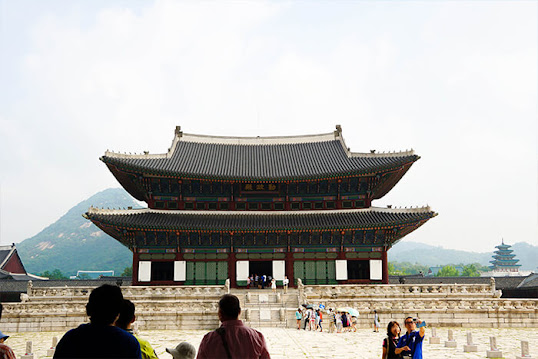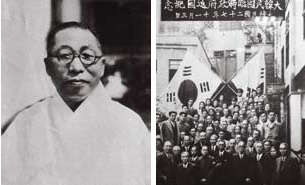The term royal term that often appears in dramas with the theme of ancient history in Korea that you should know
Wang (왕)
- King, Wang means king. This call is given to
the number one person in the kingdom. Wang's specialty was robes with luxurious
motifs and headdresses.
Wang-myeong / Go-myeong
(왕명 / 고명) - King's will,
Wang-myeong is the last will of a king, be it will or ruler. Including the name
assigned to continue the throne.
Manse (만세)
- Horay !, In practice, the word 'Manse!' Is
used as an exclamation such as 'Horay!' Or 'Hooray!'. Meanwhile, literally,
'Manse' means ten thousand. And historically used as a cry of hope that the
king will live long. That's why in saeguk (royal) dramas people shout
"manse, manse, manmanse!" When a new king ascends the throne.
Wangbi / Daebi (왕비
/ 대비) - Queen / Queen Mother,
'Wangbi' means queen, that is, the woman who is the current king's wife.
Meanwhile, 'Daebi' refers to the queen mother, namely the mother of the king or
what is commonly called the queen mother. When the king who ascended to the
throne was still a minor, usually the power would be held by the queen mother.
Jeonha / Mama (전하
/ 마마) - Venerable Sir,
this word is used to describe 'Your Highness'. Hence, in saeguk dramas, the
king is often referred to as "Jeonha" while for the queen mother, he
is called "Daebi Mama". Other phrases used to describe 'Your Majesty'
include 'Pyeha'.
Gama (가마)
- Palanquin, In Korean royal culture, when the
royal family and nobles are traveling, they will be carried using a stretcher.
Wangseja (왕세자)
- Crown Prince, the king's eldest son who one day
will replace the king's position is called 'Wonja'. However, after being
inaugurated as a candidate for successor to the throne, it was called
"Wangseja". Usually they shortened it to 'Seja' and added 'Jeoha', so
that it was called 'Seja Jeoha' or His Majesty the Crown Prince.
Seong-eun-i
mang-geuk-ha-omnida (성은 이 망극 하옵니다) - Your Kindness / Grace is Immeasurable,
This is an important phrase people use to thank the king for praise, gifts, or
even if he gives him a punishment. very light.
Nanjang-hyeong (난장
형) - Torture,
Regarding punishment, in the saeguk drama, the punishment is often a beating
with rattan, rolled up in a straw mat then beaten in a stick, and many more.
Daegun (대군)
- Great Prince, because in the kingdom there is
only one crown prince, the other brother's son who is one thousand is called
Daegun or the great prince. They are usually called 'Daegum' which means His
Royal Highness the Prince.
Gongju (공주)
- Princess,
Although saeguk dramas tend to focus on princes, don't forget the existence of
Puteri aka the daughter of the king. A daughter born to the king and queen's
parents is called "Gongju" or often called "gongju-mama".
Agasshi (아가씨)
- Miss, Agasshi is a nickname addressed to the
daughter of a noble. Also usually shortened to 'Asshi'.
Nu-i / Orabeoni (누이
/ 오라버니) - Older Sister / Older Brother,
'noona' is the nickname of an older woman. Meanwhile, 'oppa' is what women call
older men. In saeguk dramas, the word 'noona' is replaced by 'nu-I' and 'oppa'
is replaced with 'orabeoni'.
Yangban (양반)
- Nobility, Yangban were the elite rulers of the
Joseon dynasty. They are officials and educated people who have shares in
government. In Korean dramas, Yangban is divided into two, namely good (likes
to give advice and opinions to the king in solving problems) and evil (who
tries to seize power for his own sake).
Gol-pum-je-do (골품제
도) - The Caste System,
Gol-pum-je-do is a caste system in Ancient Silla that separated society based
on the relationship of people to the throne. The top ranks are 'Sacred Bones'
('seonggol'), are those who are directly related to the royal family (both
parents are related to the kingdom), while 'True Bone' ('jingol') is when only
one of the parents is related to kingdom. There are at least five additional
ranks that define what jobs a person can get, who they can marry, and even what
clothes they can wear.
Hwarang (화랑)
- Handsome knight, Hwa means 'flower'. Whereas
the Hwarang were a group of young men in the Silla period who were trained in
culture, martial arts, and various scientific teachings and were also known for
being extraordinarily handsome.
Gung (궁)
- Palace, Gung is the general designation for
the palace. Each part of the palace has a different designation. The queen's
residence in the center of the palace is called Junggungjeon, the prince's
residence in the eastern part is called Donggung, and many more.




Komentar
Posting Komentar